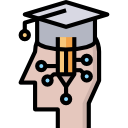AI and the Transformation of Curriculum Design
Artificial intelligence is reshaping many industries, and education is no exception. The emergence of AI-powered tools is revolutionizing the way educators conceive, plan, and implement curricula for learners of all ages. By leveraging AI, schools and educators can craft highly personalized, adaptive, and effective learning experiences that were previously unattainable. This transformation is more than a technological shift—it is a fundamental reimagining of how knowledge is structured, delivered, and absorbed in the modern classroom.
Revolutionizing Curriculum Development

Data-Driven Insights for Curriculum Enhancement
The proliferation of data within educational environments allows AI to generate deep insights into what works and what doesn’t. Instead of designing curricula based on assumptions or limited experiences, educators can now analyze performance metrics, learning patterns, and engagement statistics across diverse student populations. This real-time feedback identifies content gaps, reveals underperforming modules, and suggests improvements. Consequently, curriculum enhancements are not just reactive but proactively tailored to optimize student success and keep pace with evolving academic standards.

Automating Time-Consuming Processes
One of AI’s most tangible impacts on curriculum design is automating repetitive and labor-intensive tasks. Scheduling, sequencing content, and aligning learning objectives with standards can take countless hours, but intelligent systems streamline these processes significantly. This automation frees educators to devote more time to creative pedagogical strategies and meaningful student interactions. Moreover, AI-driven platforms can quickly update resources and course materials to reflect changes in requirements or best practices, ensuring a perpetually relevant curriculum.

Enhanced Collaboration among Educators
AI is not just an individual teacher’s toolkit—it’s a collaborative engine that connects educators with shared challenges and innovative solutions. Intelligent curriculum platforms allow teachers to contribute, review, and remix modules, fostering a culture of collective intelligence. This shared environment amplifies best practices and enables schools to pool expertise for more effective curriculum design. Moreover, AI analyses highlight successful strategies across different contexts, encouraging cross-pollination of ideas and continual improvement of teaching methods.
Tailoring Learning Paths to Individual Needs
Using sophisticated algorithms, AI analyzes each student’s strengths, weaknesses, and learning styles to craft custom learning paths. This personalization ensures that students are neither bored by repetitive material nor overwhelmed by concepts for which they lack foundation. Instead, learners are presented with content that matches their unique profiles, maximizing engagement and retention. Over time, the system adjusts and evolves as students progress, providing continual support that adapts to their growing competencies.
Real-Time Feedback and Assessment
AI-powered curriculum systems provide immediate, actionable feedback to both students and educators. With instant analysis of student submissions, quizzes, and participation, teachers gain clear visibility into each learner’s progress—enabling timely intervention when challenges arise. Students, in turn, benefit from ongoing assessment that helps them identify areas requiring further attention. This constant feedback loop promotes self-paced learning and encourages a growth mindset, while ensuring no student is left behind.

Aligning Curriculum With Emerging Industry Demands
AI systems can analyze global trends, job market data, and industry forecasts to predict the skills employers will value in the coming years. With this intelligence, curriculum designers can embed relevant topics—such as computational thinking, digital literacy, and creative problem-solving—into their courses. These forward-looking programs ensure students graduate not only with academic credentials but also with real-world abilities that prepare them for lifelong success in a rapidly changing landscape.

Encouraging Critical Thinking and Creativity
Automated, rote learning is no longer sufficient in an age where innovation is the currency of progress. AI-enhanced curriculum design places a greater emphasis on higher-order thinking, collaboration, and creativity. Intelligent simulations and project-based learning modules challenge students to solve authentic problems and work together across disciplines. Students are encouraged to think outside the box, undertake complex tasks, and develop intellectual resilience—skills crucial for thriving in uncertain times.

Facilitating Continuous Learning and Up-skilling
Lifelong learning is essential in the age of automation, where new skills are required at an ever-increasing pace. AI-driven curricula support this by recommending new learning opportunities and self-paced modules as students’ interests and the job market evolve. Adults returning to education and professionals seeking to up-skill benefit from these adaptive programs, which make it easy to acquire and update knowledge throughout their careers. This commitment to continuous learning keeps both individuals and societies competitive and adaptable in the global economy.
